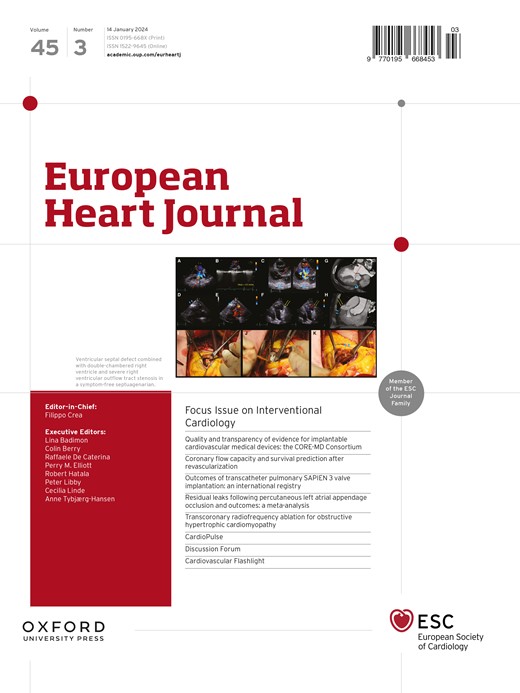Cardiovascular events following coronavirus disease 2019 vaccination in adults: a nationwide Swedish study
IF 37.6
1区 医学
Q1 CARDIAC & CARDIOVASCULAR SYSTEMS
引用次数: 0
Abstract
Background and Aims While the rationale for coronavirus disease 2019 (COVID-19) vaccination is to reduce complications and overall mortality, some cardiovascular complications from the vaccine itself have been demonstrated. Myocarditis and pericarditis are recognized as rare acute adverse events after mRNA vaccines in young males, while evidence regarding other cardiovascular events remains limited and inconsistent. This study assessed the risks of several cardiovascular and cerebrovascular events in a Swedish nationwide register-based cohort. Methods Post-vaccination risk of myocarditis/pericarditis, dysrhythmias, heart failure, myocardial infarction, and cerebrovascular events (transient ischaemic attack and stroke) in several risk windows after each vaccine dose were assessed among all Swedish adults (n = 8 070 674). Hazard ratios (HRs) with 95% confidence intervals (95% CIs) compared with unvaccinated were estimated from Cox regression models adjusted for potential confounders. Results For most studied outcomes, decreased risks of cardiovascular events post-vaccination were observed, especially after dose three (HRs for dose three ranging from .69 to .81), while replicating the increased risk of myocarditis and pericarditis 1–2 weeks after COVID-19 mRNA vaccination. Slightly increased risks, similar across vaccines, were observed for extrasystoles [HR 1.17 (95% CI 1.06–1.28) for dose one and HR 1.22 (95% CI 1.10–1.36) for dose two, stronger in elderly and males] but not for arrhythmias and for transient ischaemic attack [HR 1.13 (95% CI 1.05–1.23), mainly in elderly] but not for stroke. Conclusions Risk of myopericarditis (mRNA vaccines only), extrasystoles, and transient ischaemic attack was transiently increased after COVID-19 vaccination, but full vaccination substantially reduced the risk of several more severe COVID-19-associated cardiovascular outcomes, underscoring the protective benefits of complete vaccination.2019年成人冠状病毒疾病疫苗接种后的心血管事件:一项全国性瑞典研究
背景和目的 虽然接种 2019 年冠状病毒病(COVID-19)疫苗的目的是减少并发症和总体死亡率,但疫苗本身也会引起一些心血管并发症。心肌炎和心包炎被认为是年轻男性接种 mRNA 疫苗后罕见的急性不良反应,而有关其他心血管事件的证据仍然有限且不一致。本研究评估了瑞典全国登记队列中几种心脑血管事件的风险。方法 对所有瑞典成年人(n = 8 070 674)进行了疫苗接种后心肌炎/心包炎、心律失常、心力衰竭、心肌梗死和脑血管事件(短暂性缺血发作和中风)的风险评估。根据对潜在混杂因素进行调整后的 Cox 回归模型估算出与未接种疫苗者相比的危险比 (HRs) 及 95% 置信区间 (95%CIs)。结果 就大多数研究结果而言,观察到接种疫苗后心血管事件的风险降低,尤其是接种第三剂后(第三剂的HR值在0.69至0.81之间),同时复制了接种COVID-19 mRNA疫苗1-2周后心肌炎和心包炎风险升高的情况。不同疫苗接种后心律失常的风险略有增加[第一剂的 HR 为 1.17(95% CI 为 1.06-1.28),第二剂的 HR 为 1.22(95% CI 为 1.10-1.36),老年人和男性的风险更高],但心律失常和短暂性脑缺血发作的风险没有增加[HR 为 1.13(95% CI 为 1.05-1.23),主要是老年人],但中风的风险没有增加。结论 接种 COVID-19 疫苗后,心肌炎(仅限 mRNA 疫苗)、期外收缩和短暂性脑缺血发作的风险会短暂升高,但完全接种会大大降低几种更严重的 COVID-19 相关心血管疾病的风险,从而强调完全接种的保护性益处。
本文章由计算机程序翻译,如有差异,请以英文原文为准。
求助全文
约1分钟内获得全文
求助全文
来源期刊

European Heart Journal
医学-心血管系统
CiteScore
39.30
自引率
6.90%
发文量
3942
审稿时长
1 months
期刊介绍:
The European Heart Journal is a renowned international journal that focuses on cardiovascular medicine. It is published weekly and is the official journal of the European Society of Cardiology. This peer-reviewed journal is committed to publishing high-quality clinical and scientific material pertaining to all aspects of cardiovascular medicine. It covers a diverse range of topics including research findings, technical evaluations, and reviews. Moreover, the journal serves as a platform for the exchange of information and discussions on various aspects of cardiovascular medicine, including educational matters.
In addition to original papers on cardiovascular medicine and surgery, the European Heart Journal also presents reviews, clinical perspectives, ESC Guidelines, and editorial articles that highlight recent advancements in cardiology. Additionally, the journal actively encourages readers to share their thoughts and opinions through correspondence.
 求助内容:
求助内容: 应助结果提醒方式:
应助结果提醒方式:


